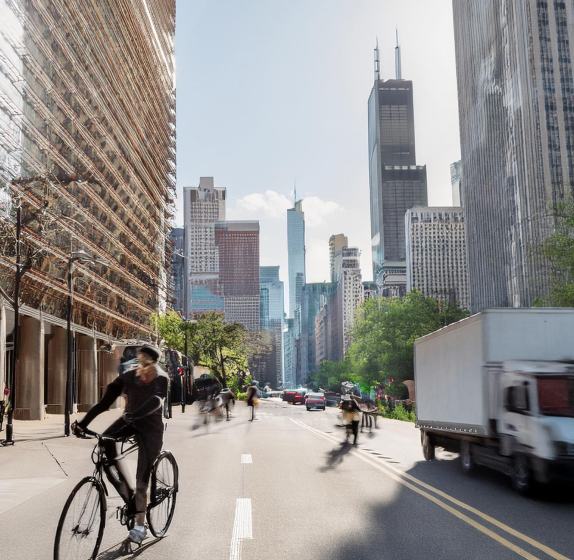The Chicago government is implementing the “Smart Streets Pilot Program” to improve traffic safety, enhance protection for pedestrians and cyclists, and speed up public transportation. The initiative aims to modernize the city’s transportation system using camera technology to regulate parking and standing in bus and bike lanes. This will help reduce congestion in bike lanes and prevent cyclists and motorcyclists from merging into mixed lanes. Additionally, this will help reduce crashes and pedestrian and cyclist fatalities while ensuring that Chicago’s growing network of bike and bus lanes are working efficiently.

Image generated using Adobe Firefly.
From Congestion to Community: The History of Mobility Challenges in Chicago
Chicago faces multiple mobility challenges, including congestion, accessibility issues, and the need for equitable transportation solutions. Traffic congestion has long been a major problem for the city, and population growth and the rise of automobiles have only exacerbated these problems. The city’s industrial boom resulted in high population and employment densities, generating travel demands that far exceeded the capacity of the road infrastructure.
Transportation inequities in Chicago are a major concern, encompassing disparities in transportation options, traffic safety, economic challenges, and pedestrian safety. Communities of color in Chicago often have the most significant inequalities in transportation choices, longer commute times, and higher exposure to pollution and traffic-related violence. Black residents are disproportionately affected by traffic fatalities. To address these issues, Chicago has taken various measures over the years, including relocating markets, building multi-level roads, banning left turns in certain areas, and installing traffic lights at downtown intersections.
Implementation of the Smart Streets Pilot Program
The Pilot Program was approved in March 2023 and after a year and a half the pilot kicked off with a 30-day warning period. Currently, “registered vehicle owners will receive mailed warnings for infractions like parking in bike and bus lanes,” Chicago Department of Transportation stated. “Beginning on December 5, drivers will receive a warning notice for the first offense, with subsequent violations resulting in fines.” Soon, the technology will also be used to enforce metered parking. The Central Business District is the area of implementation (North Avenue, Ashland Avenue, Roosevelt Road, and Lake Michigan). The program will run for two years after it issues its first ticket, so it is likely until late 2026 or early 2027.
A key part of the plan is that Illinois must introduce new legislation to legalize the use of cameras to enforce regulations on sustainable transportation lanes, an approach that has proven effective in cities such as New York. Chicago’s new policy is designed to discourage drivers from stopping or standing in those lanes, thereby shortening travel times and making it easier for passengers with disabilities to board buses. Additionally, cyclists will no longer need to leave bike lanes and merge into mixed-traffic lanes to avoid stopped vehicles.
Resources
City of Chicago :: Smart Streets
Get Smart Streets: Everything you wanted to know about the bus and bike lane enforcement pilot, but were afraid to ask – Streetsblog Chicago
Persistent Inequities



